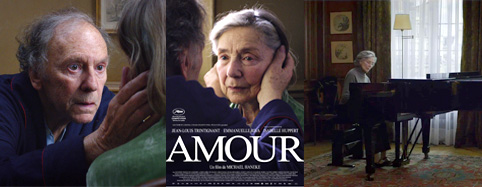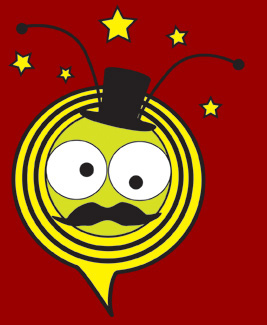
 D
DFilmed in the voyeuristic style characteristic of director Michael Haneke, Amour presents the story of an elderly couple attempting to cope when one of them suffers a series of debilitating strokes. In each scene, the camera remains stationary, resulting in moments where we merely hear the characters off-screen as they move about what has become of their lives. There is no unrealistic melodrama. Haneke allows the viewer to watch and hear what's happening and allows us to simply feel what we feel in response. It's a hard movie to watch and the feeling that we're experiencing this with them makes it that much more raw. The two lead actors, Emmanuelle Riva and Jean-Louis Trintrignant, both go through remarkable and heartbreaking transformations. The characters' love and concern for one another is clear and their pain and struggles feel devastatingly real.
Much of Amour can feel suffocatingly straightforward, but Haneke does throw in a couple of head-scratching touches, including a recurring pigeon problem and a strange interlude with pictures of art that only succeeded in reminding me of Ferris Bueller's Day Off, which I'm guessing probably wasn't the intention. It's such a smart movie, though, that I feel confident the symbolism of these moments may become clearer with multiple viewings. God bless anyone who can bring themselves to go through this a second time.
8/10 Z
ZAgainst such stiff competition as Piranha 3D and Paranormal Activity 4, Amour (Love), the new joint from director Michael Haneke, was the scariest film that I saw in 2012. I'm happy to announce that its star, Emmanuelle Riva, has finally hit her stride at the age of 85 years old, and I really look forward to seeing what else she has to bring to the screen over the next few decades.
Just to clarify things, because the poster seems to suggest that the film is a light comedy about an older woman who wears earmuffs made of human hands: Amour revolves around the twilight years of an older married couple, both retired music teachers. At breakfast one morning, Anne, the cuter of the two, goes all space cadet, an indicative sign of an imminent stroke. The rest of the film details the adjustments that Georges, her testy but also cute husband, must make in order to accommodate Anne's health problems. It's safe to say that not a lot happens in the film, so if you're looking for a good action-ey kind of horror film, Piranha 3D is probably your best bet. You'll probably be better off for it, too, if you ever want to use phrases like "You're only as old as you feel", as Amour posits that you're only as old as the number of times in a day you wet the bed and scream out unintelligibly for help and have to be dragged around the room by your collar and your annoying daughter shows up and tries to comfort you and hospice treats you like a chalkboard eraser. For Anne, that's a pretty high number. For Georges, the number's low, but there's a high incident of pigeon chasing going on.
You don't love movies like this. Movies like this aren't made to be loved. Amour is a stark reminder of how abso-fucking-lutely horrifying and undignified aging can be, and the strain that aging can have on a beautiful thing like love. Amour pretty much swept up at every film festival in 2012, and with good reason. Michael Haneke is an absolute pro at making films that can affect us on the most visceral level, and in this case: the simple sound of fabric on fabric and Anne's feet shuffling across the floor as she's dragged by Georges in a most loving death waltz literally sent chills down my spine. There's so little to love about Amour (Love) but (sigh, how do I end this?) there's a lot to love about that.
8/10 B
BAmour is about an elderly woman who is gradually and drastically losing her faculties and the manner in which she and her husband must cope. We are given the outcome of the story right at the beginning of the film so that we are able to anticipate and understand the grief and symbolism that follows. This makes for an extremely heavy film, intensifying the tragedy and giving true meaning to the title "love" and how deeply it affects the actions of the characters.
Director Michael Haneke has a wonderful way of putting a microscope to his characters in order for us to examine all the subtle yet important moments that tell the story. Each scene takes its time, yet we want to focus on each one in case we miss something. The minimal style directing (no scoring, little and subtle camera movement, few edits, almost no change in setting) allows Haneke to grab our attention when he makes a break in often straightforward scenes. As in his other works, we really get to know the geography of the film so that we feel involved. For instance if we hear something outside a frame and a character moves towards that sound, we know where they are headed and we start to speculate.
All of the acting is amazing. Seeing Emmanuelle Riva deteriorate is absolutely heartbreaking. It is almost too heavy to deal with, but this film is worth seeing at least once for its extraordinary handling of an unfortunately ordinary part of life.
8/10
